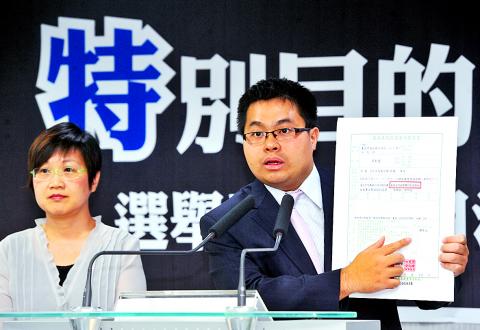The Special Investigation Division (SID) of the Supreme Prosecutors’ Office’s subpoena of Democratic Progressive Party (DPP) Secretary-General Joseph Wu (吳釗燮) could be illegal and politically motivated, the DPP said yesterday.
“Wu was listed as an ‘interested party’ in a recent subpoena from the SID... on which no details of the case were listed. The division appears to have violated the Code of Criminal Procedure (刑事訴訟法),” DPP spokesperson Huang Di-ying (黃帝穎) told a press conference.
According to the code, the SID should have listed the origin of the case and the identity of the subpoenaed — be it a witness or a defendant, Huang said, adding that “interested party” was not an identity as regulated by the code, which means that the subpoena could be illegal.

Photo: Chien Jung-fong, Taipei Times
The DPP also suspected that there is a hidden agenda behind the investigation and the subpoena because the SID “is notorious for its interference in several high-profile political cases in recent years,” the spokesperson said.
That is why the division has earned the nickname “the investigation division with special motives,” he added.
“That is also why we cannot help but wonder whether there is any political agenda behind Wu’s subpoena, as the division chose to launch an investigation into a high-ranking official of the opposition party in the run-up to the seven-in-one elections in November,” Huang said.
DPP spokesperson Hsu Chia-ching (徐佳青) said Wu would discuss the matter with the party and his lawyers before deciding whether to report to the SID.
With regards to claims of a planned purge targeting high-ranking DPP officials, Hsu said the party preferred not to speculate or over-analyze the case at the moment, but the division’s past investigations against opposition politicians and the fact that the subpoena was issued on June 26, about a month after DPP Chairperson Tsai Ing-wen (蔡英文) assumed the part post, did not give the party any reason for optimism.
“Many DPP members have been able to survive judicial oppression, but their innocence was proven only after years of court appearances and trials. We hope nothing like this will happen before the year-end elections and the presidential election in 2016,” Hsu said.
In response, the SID denied that there were any political considerations involved in the investigation, the Chinese-language Liberty Times (the Taipei Times’ sister newspaper), reported.
The SID said the ongoing case in which Wu is involved is related to a violation of the Classified National Security Information Protection Act (國家機密保護法), but that the division could not go into details.
Chinese Nationalist Party (KMT) spokesperson Charles Chen (陳以信) said the DPP had made allegations against the KMT and the judiciary without any solid evidence.
“The accusation itself is a cheap political maneuver orchestrated by the DPP,” Chen said.
The rumor that the KMT is trying to “annihilate” Tsai with the judicial investigation is a DPP smear campaign, which shows that the party wants to achieve its political goals even at the cost of losing public trust in the judicial system, the spokesperson said.

‘FORM OF PROTEST’: The German Institute Taipei said it was ‘shocked’ to see Nazi symbolism used in connection with political aims as it condemned the incident Sung Chien-liang (宋建樑), who led efforts to recall Democratic Progressive Party (DPP) Legislator Lee Kun-cheng (李坤城), was released on bail of NT$80,000 yesterday amid an outcry over a Nazi armband he wore to questioning the night before. Sung arrived at the New Taipei City District Prosecutors’ Office for questioning in a recall petition forgery case on Tuesday night wearing a red armband bearing a swastika, carrying a copy of Adolf Hitler’s Mein Kampf and giving a Nazi salute. Sung left the building at 1:15am without the armband and apparently covering the book with a coat. This is a serious international scandal and Chinese

SECURITY: As China is ‘reshaping’ Hong Kong’s population, Taiwan must raise the eligibility threshold for applications from Hong Kongers, Chiu Chui-cheng said When Hong Kong and Macau citizens apply for residency in Taiwan, it would be under a new category that includes a “national security observation period,” Mainland Affairs Council (MAC) Minister Chiu Chui-cheng (邱垂正) said yesterday. President William Lai (賴清德) on March 13 announced 17 strategies to counter China’s aggression toward Taiwan, including incorporating national security considerations into the review process for residency applications from Hong Kong and Macau citizens. The situation in Hong Kong is constantly changing, Chiu said to media yesterday on the sidelines of the Taipei Technology Run hosted by the Taipei Neihu Technology Park Development Association. With

A US Marine Corps regiment equipped with Naval Strike Missiles (NSM) is set to participate in the upcoming Balikatan 25 exercise in the Luzon Strait, marking the system’s first-ever deployment in the Philippines. US and Philippine officials have separately confirmed that the Navy Marine Expeditionary Ship Interdiction System (NMESIS) — the mobile launch platform for the Naval Strike Missile — would take part in the joint exercise. The missiles are being deployed to “a strategic first island chain chokepoint” in the waters between Taiwan proper and the Philippines, US-based Naval News reported. “The Luzon Strait and Bashi Channel represent a critical access

COUNTERINTELLIGENCE TRAINING: The ministry said 87.5 percent of the apprehended Chinese agents were reported by service members they tried to lure into becoming spies Taiwanese organized crime, illegal money lenders, temples and civic groups are complicit in Beijing’s infiltration of the armed forces, the Ministry of National Defense (MND) said in a report yesterday. Retired service members who had been turned to Beijing’s cause mainly relied on those channels to infiltrate the Taiwanese military, according to the report to be submitted to lawmakers ahead of tomorrow’s hearing on Chinese espionage in the military. Chinese intelligence typically used blackmail, Internet-based communications, bribery or debts to loan sharks to leverage active service personnel to do its bidding, it said. China’s main goals are to collect intelligence, and develop a